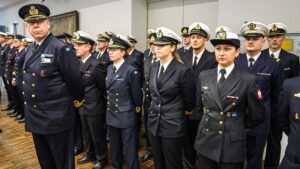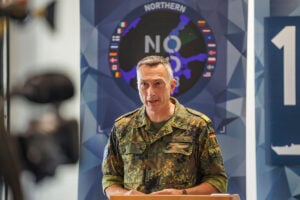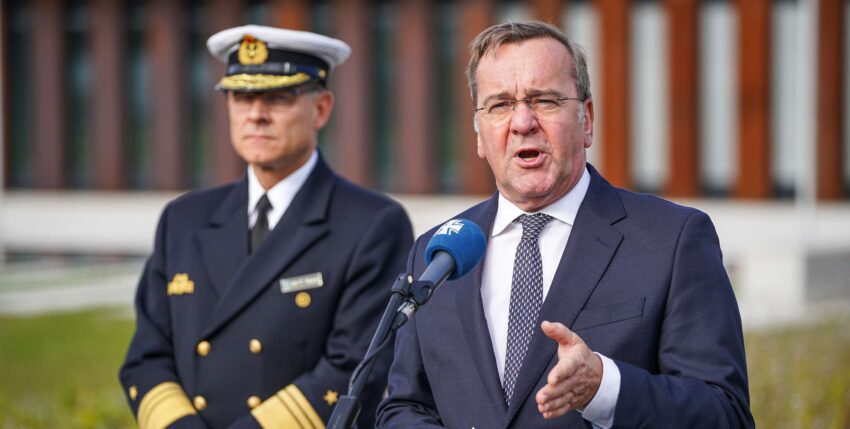Defence Minister Boris Pistorius inaugurated a new headquarters in Rostock on 21 October 2024

They are CTC Commander Task Force Baltic: Marines from 13 nations, here at the deployment ceremony in Rostock Bundeswehr/Nico Theska
The German Navy officially assumed a regional leadership role today - it will fulfil the function of "Commander Task Force Baltic" (CTF Baltic) for the next four years. This gives it greater responsibility in the Baltic Sea region. CTF Baltic is available for command tasks of the Alliance in the Baltic Sea, maintains a maritime situation picture and coordinates naval activities in the region. It is also tasked with planning exercises and conducting operations by NATO naval forces. For the Bundeswehr, this is a strengthening of national and alliance defence. This was clearly underlined by the Federal Minister of Defence Boris Pistorius, who personally performed the installation ceremony. The Baltic Sea is back in focus, not least due to Russian aggression. After the Cold War, the focus had been on comprehensive cooperation in the Baltic Sea, but now military strength is once again in demand, "unfortunately", the Minister stated. And the German Navy historically has comprehensive, regional expertise and broad capabilities for naval warfare in the Baltic Sea. Moreover, even after Finland and Sweden joined NATO, it is still the largest NATO navy in the Baltic Sea.

As part of the adaptation of its command structure since 2017, NATO has also decided to set up permanent maritime headquarters at the so-called top tactical level. These commander task force headquarters have two main tasks: to plan maritime operations and exercises and to lead naval forces assigned by NATO in peace, crisis and war. For these purposes, CTF Baltic in the Baltic Sea region is to provide the Alliance with an up-to-date maritime situation picture around the clock, combining military and civilian data. Unfortunately, some media have spoken of a new "NATO headquarters"That is not correct. CTF Baltic is a national headquarters with multinational participation. It will be led by the German Admiral Stephan Haisch. The position of his deputy will initially be filled by a Polish admiral and that of Chief of Staff by a Swedish staff officer. The German Navy will provide the majority of the personnel and command infrastructure for the DEU MARFOR task force. In addition to Germany, eleven other nations are also involved in CTF Baltic: Denmark, Estonia, Finland, France, Great Britain, Italy, Latvia, Lithuania, the Netherlands, Poland and Sweden. In peacetime, 180 posts are already occupied in CTF Baltic, 60 of which are multinational. In the event of a crisis or conflict, the staff can grow to up to 240 posts. These individual secondments of personnel from other NATO members to the German headquarters are not NATO troop deployments. After four years, a rotation with Poland and Sweden is planned.

See also: Deutsche Welle - Fact check
https://www.dw.com/de/faktencheck-verst%C3%B6%C3%9Ft-nato-pr%C3%A4senz-in-rostock-gegen-zwei-plus-vier-vertrag/a-70512246









5 responses
Unfortunately, not everyone involved in the discussion is aware of the legal situation. Even though the editors have thankfully already put a lot of things right, I would like to set the record straight on some of the things that are sometimes mixed up in the discussion here and elsewhere.
The headquarters is not a NATO headquarters, nor is there, as some people claim, only one NATO headquarters in Brussels. Here is some background information. NATO headquarters are centres that are operated by NATO itself. Together they form the NATO Command Structure (NCS). (https://de.wikipedia.org/wiki/NATO-Kommandostruktur)
NATO troops are provided by the nations. They form the NATO Force Structure (NFS) (https://de.wikipedia.org/wiki/NATO-Streitkräftestruktur, https://www.nato.int/cps/en/natohq/topics_69718.htmwhich is subordinate to the NCS and must be distinguished from it. The NFS in turn includes national and multinational headquarters (HQ), which are responsible for the lower command levels. The armed forces of the Bundeswehr in the accession area are part of the NATO force structure.
This is expressly permitted by the 2+4 Treaty, which states: "After the withdrawal of Soviet armed forces from the territory of the present German Democratic Republic and Berlin has been completed, German armed forces units may also be stationed in this part of Germany, which are assigned to military alliance structures in the same way as those on the remaining German territory, but without nuclear weapons carriers." (Art 5, para 3, sentence 1). The Joint Staff established in Rostock is part of these German armed forces in the accession territory and thus part of the NFS.
With regard to the question of whether foreign officers are allowed to work in this HQ, Article 5, paragraph 3, sentence 3 is often quoted: "Foreign armed forces and nuclear weapons or their carriers shall neither be stationed in this part of Germany nor transferred there." From this a deployment ban for all individual foreign soldiers is inferred. This is not valid insofar as these officers do not form an independent foreign structure, but are an integral part of a German service. Incidentally, not even Russia has ever taken offence at the fact that foreign liaison officers have long been deployed at the Operational Command in Potsdam.
According to Article 5 of the 2 plus 4 Treaty of 21 October 1991, paragraph 3 (3), last sentence reads: "Foreign armed forces and nuclear weapons or their carriers shall neither be stationed in nor transferred to this part of Germany." This regulation is more than unambiguous, and the assertion that foreign armed forces are only deployed there on a one-off basis as part of the "standby" is a violation of the 2 plus 4 Agreement! The stay of foreign military personnel is not planned for a few days or a few weeks, but for several years! The national headquarters will be headed by a German admiral for the next 5 years. And afterwards......?! A typical appeasement argument to take the population for fools!
Dear Mr Born,
The following clarification on today's official installation of the Maritime Headquarters "for" NATO in Rostock: Unfortunately, the news reported in the media does not always correspond to the facts - this leads to unnecessary misinterpretation and avoidable excitement.
The MHQ CTF Baltic (Maritime Headquarters, Commander Task Force Baltic), which has now emerged from the DEU MARFOR (German Maritime Forces) command and operations staff at Rostock Naval Command, is a "national service centre with multinational participation" and does not constitute a "stationing of foreign armed forces" within the meaning of the 2plus4 Treaty of 1991.
For the next four years, the German Navy will fulfil the function of CTF Baltic through a German flag officer. This officer has the following tasks
firstly - to draw up the military situation picture for the Baltic Sea operational area,
secondly, to plan joint exercises between different NATO nations in the theatre of operations, and
thirdly - to conduct these naval exercises and deployments.
Due to the intensification of the military situation in Europe, some maritime tasks that were previously only carried out after activation for specific projects and in the event of a crisis are now fulfilled on a permanent and structured basis - in terms of personnel (staff) and material (buildings). In addition to the premises in Rostock, the CTF also utilises the DEU MARFOR task force in the naval command, which accordingly provides a large proportion of the CTF staff. The NATO navies of France, Great Britain and Italy follow the same procedure.
CTF Baltic is therefore a national tactical headquarters with multinational participation - it is expressly not a structural and hierarchical component of the NATO command structure. The individual deployment of personnel from other NATO countries to this HQ therefore does not constitute a "troop deployment of NATO forces" within the meaning of the 2plus4 Treaty, nor does the fulfilment of CTF Baltic's tasks conflict with Germany's treaty obligations.
The establishment of the new command in Rostock involves 12 alliance nations with 27 military personnel - with an increase to a total of 180 posts, this contingent could comprise a maximum of 60 posts. For the first few years, a German admiral will lead the command with a Polish deputy and a Swedish chief of staff. A rotation between these three nations is planned every four years.
Once again: The deployment of CTF Baltic with multinational components does not mean that other NATO nations are stationing troops in the new federal states. CTF Baltic is a command and task force "for" NATO - it is made available to NATO when required - and not "to" NATO.
Nobody should be taken for a fool here - and certainly not by the navy or marineforum - unless he/she wants to be!
For the editorial team
Axel Stephenson
Wikipedia states that no troops of foreign states may be stationed in East Germany. 2+ 4 treaty of 1990
Dear Mr "Diwobi", please read carefully: "CTF Baltic is a purely national headquarters with multinational participation". It is therefore not a headquarters the NATO, but for NATO. They correctly refer to Art. 5 Para. 3 of the Two Plus Four Treaty, although no permanent troop deployments are planned, only individual deployments of soldiers from various NATO nations. In this respect, the procedure does not violate the 2+4 Treaty. The Federal Government is authorised to decide on a case-by-case basis (keyword: Armed Forces Residence Agreement). Admittedly, it is complicated.